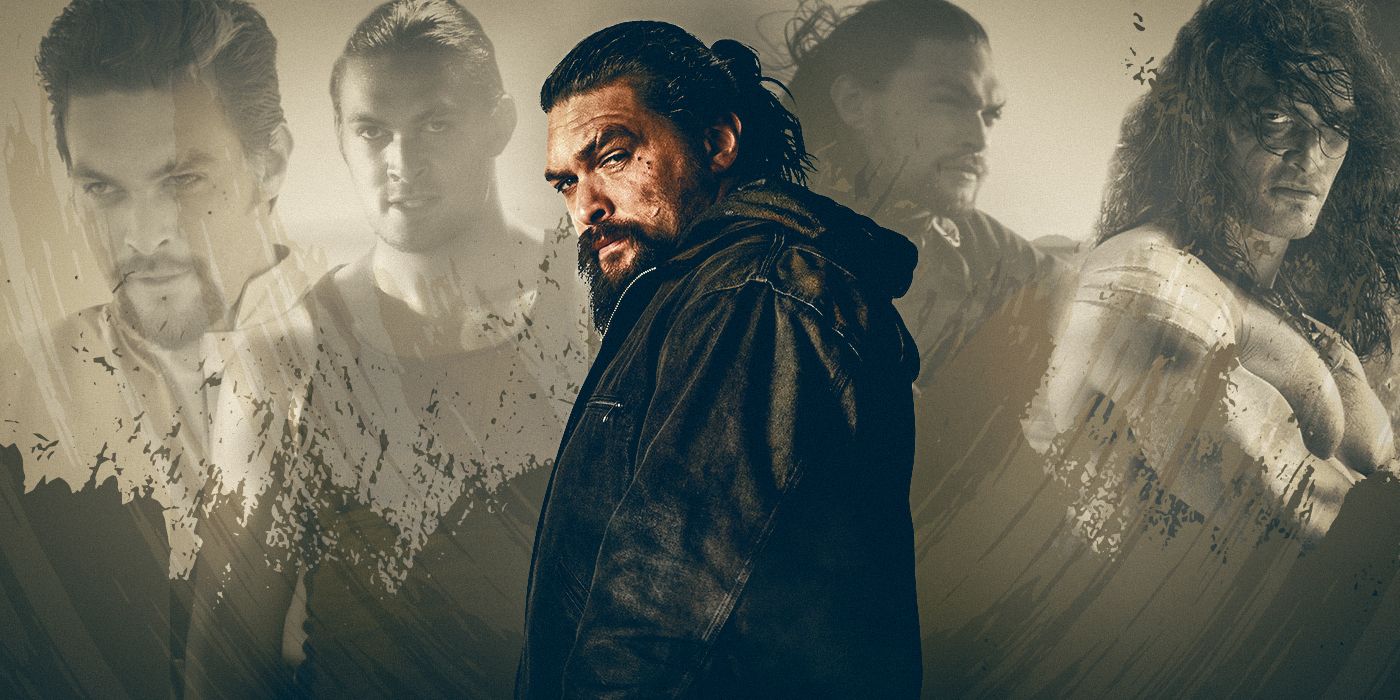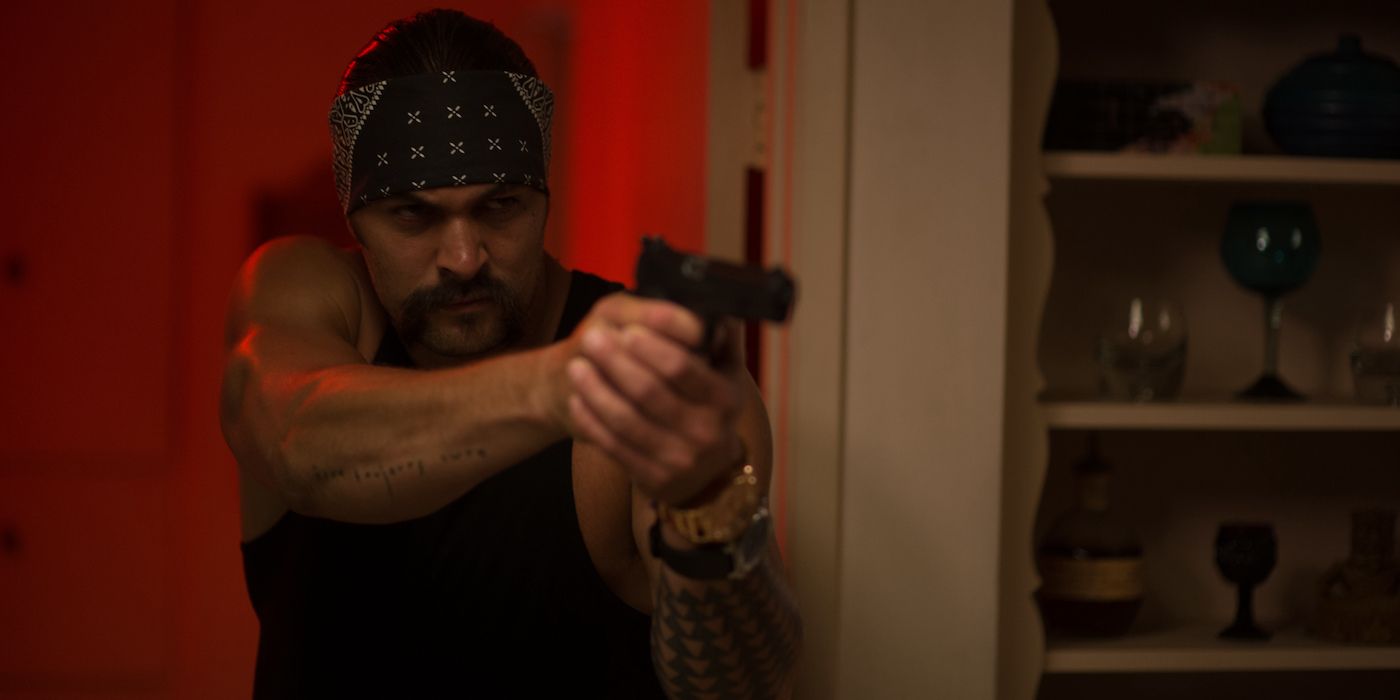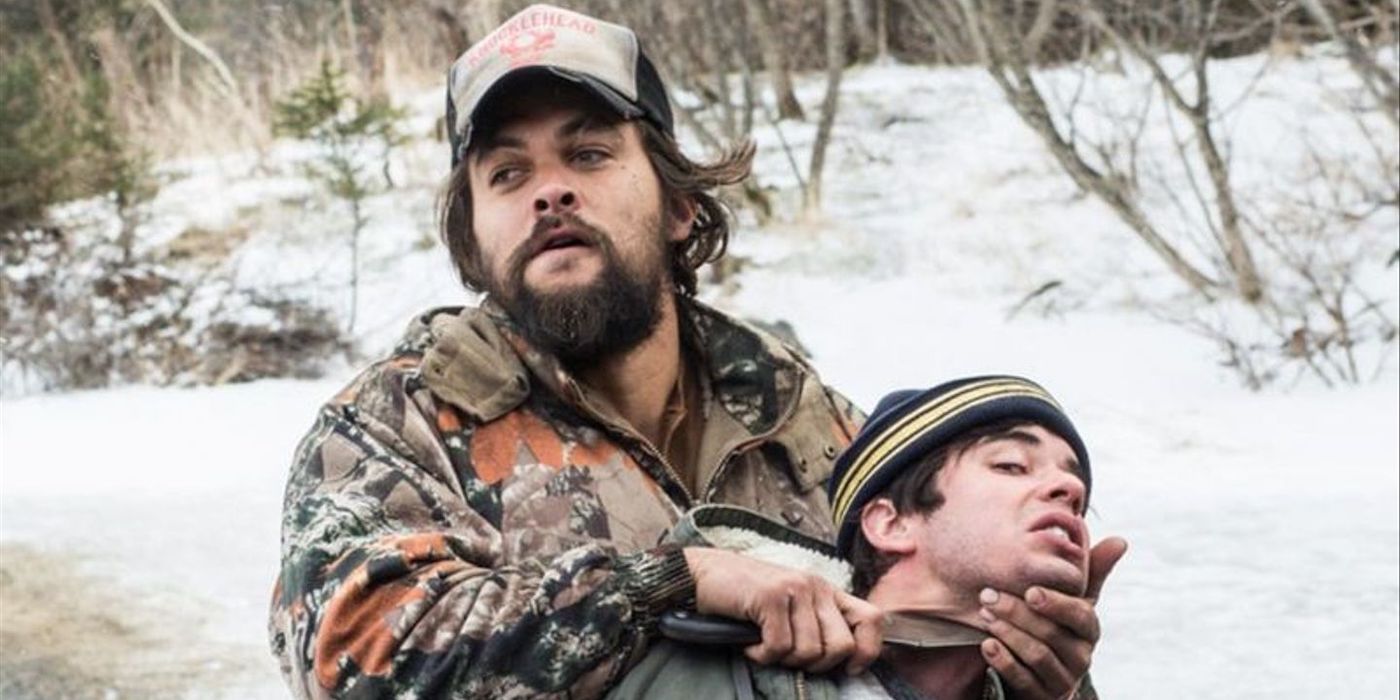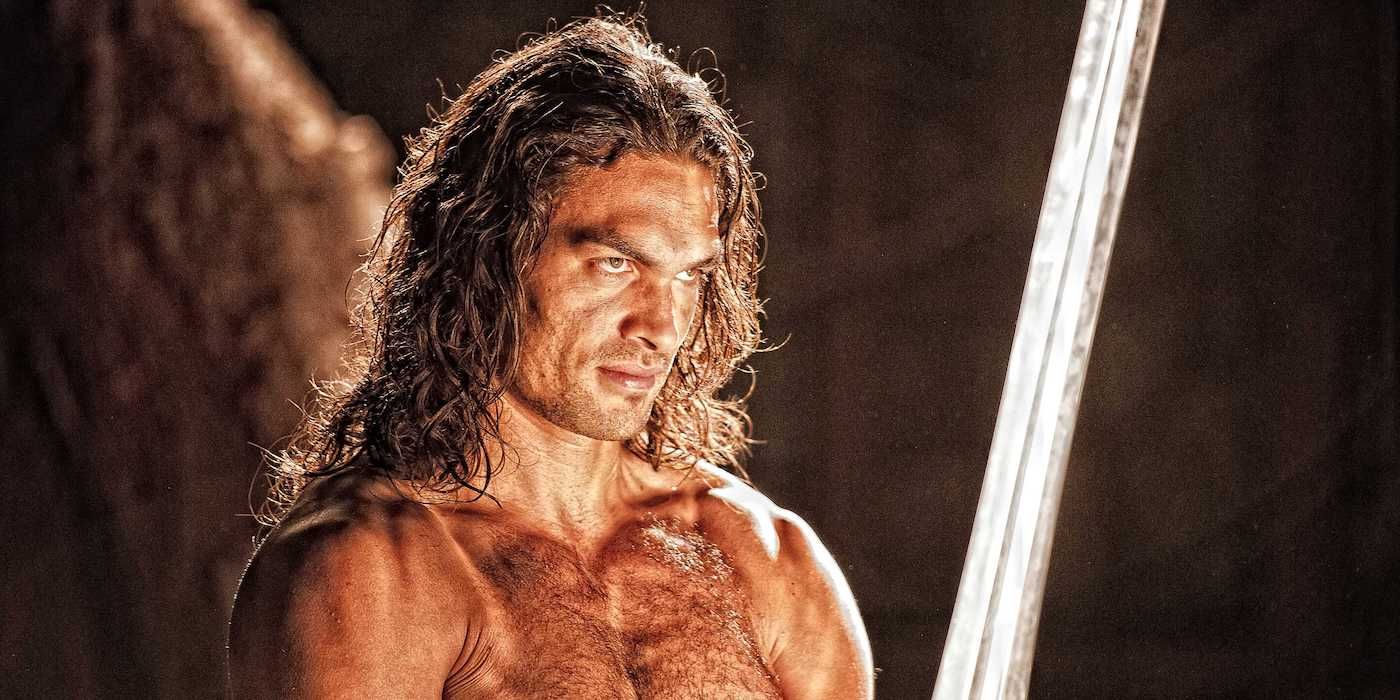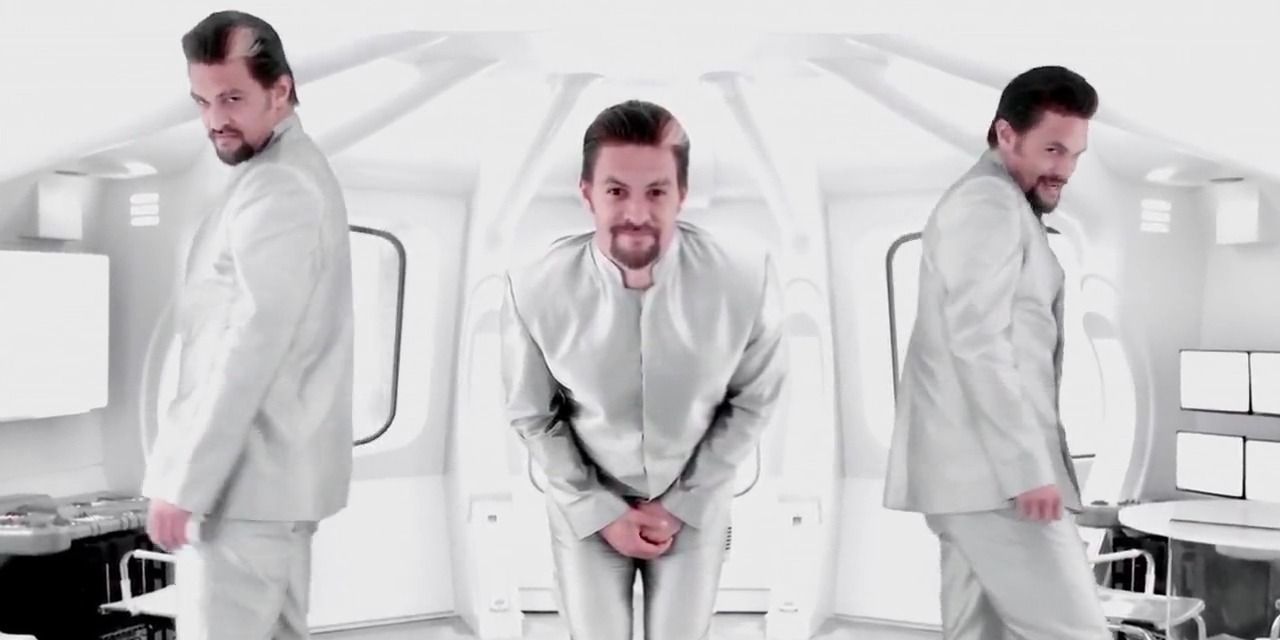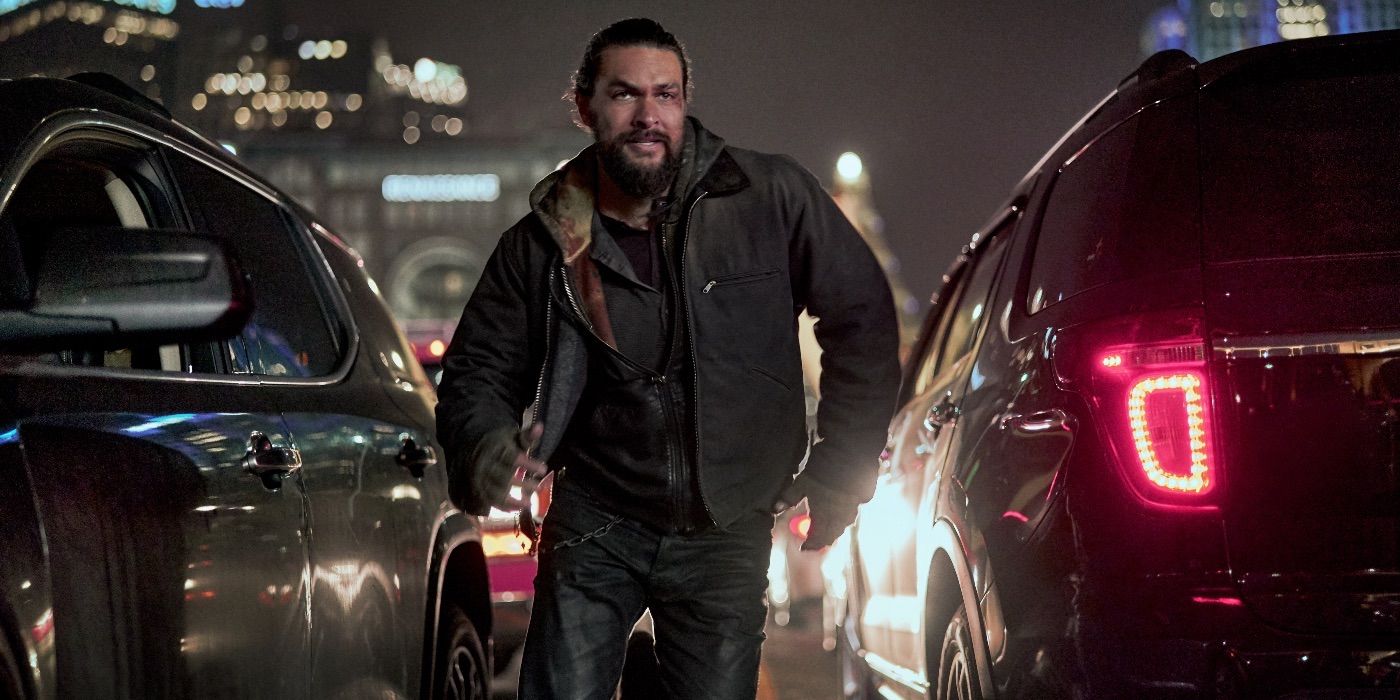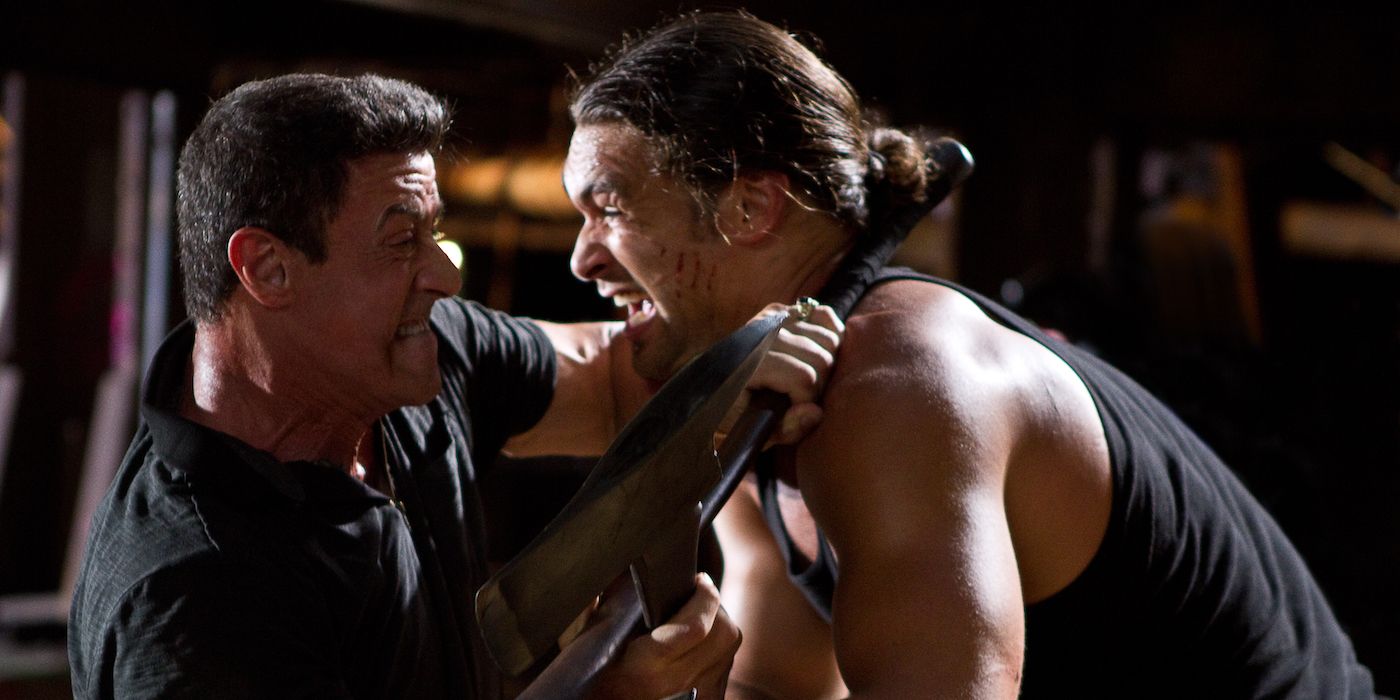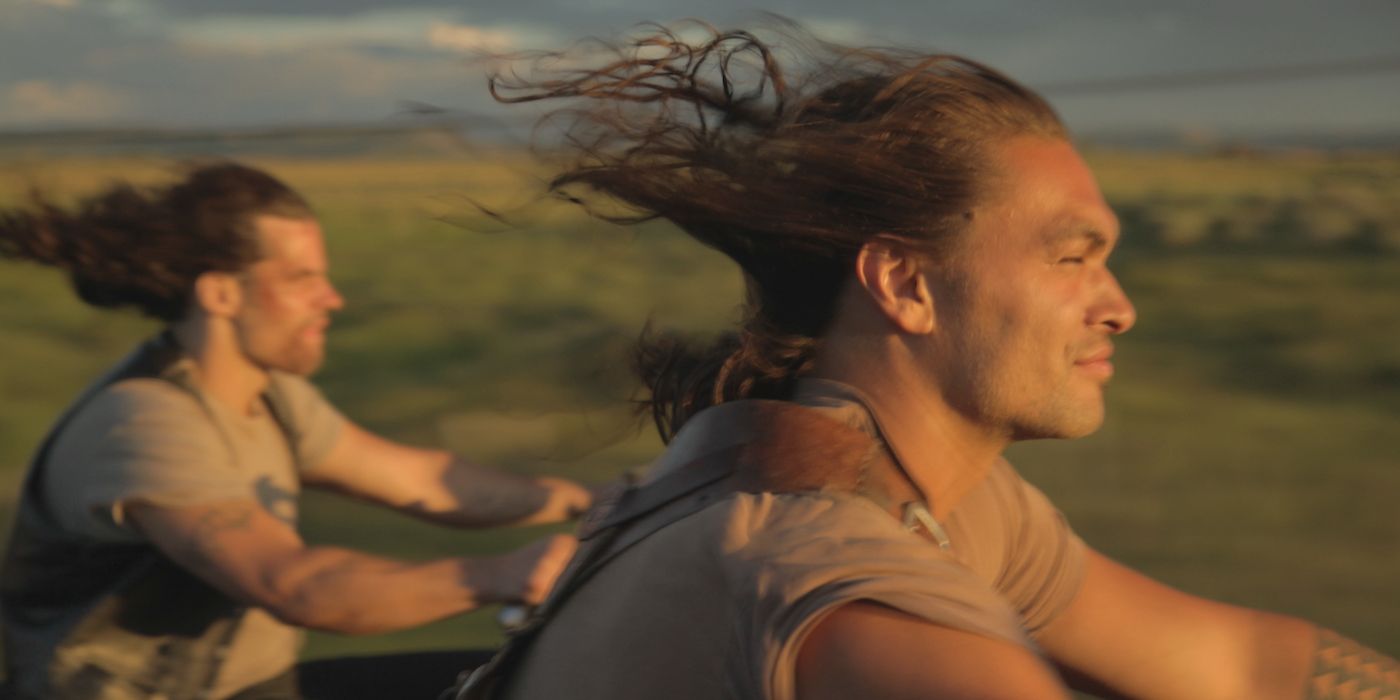What makes Jason Momoa so watchable as Arthur "Aquaman" Curry in his slate of DCEU movies? I'd argue it's in large part due to the inherent clash of contexts within how the movie star looks — like a hulking missile of violence — and how he behaves — like an excited puppy ready to play. Momoa has fun in this role; even his desaturated performance in Zack Snyder's Justice League radiates with charisma, eagerness, and a kind of "aw shucks" glee. Fun Momoa is fun for all; when he says "My man," you feel like you are his man; when he takes off his cardigan and lurches forward to find someone hiding in this all-timer SNL sketch, you feel like he is on a mission to find, and play with, you. In this accessible, joyful, invigorated mode, Momoa shines brightly.
But there's another version of Momoa honed on the movie screen, one that might have more in common with his other iconic franchise screen role as Khal Drogo in Game of Thrones. In this version, the movie star plays into his enormity, hunching forward not to tackle you with a bear hug but with a gut-crunching power-bomb. He is tortured and he wishes to torture; he is broken up and believes the only way to make himself whole is to break others. He contorts his body into a purposeful missile... of revenge.
To date, Jason Momoa has starred in seven feature films in which his character is "out for revenge," the most recent being his 2021 Netflix hit Sweet Girl. I'll be blunt: I don't think a single one of them is particularly successful, and the ones that come closest do so because of their willingness to mess with the "dour, violent giant" archetype we so often see in revenge flicks (whether intentionally threaded into the film's DNA or bursting through the seams because Momoa can't help but "have fun" on screen). As such, to watch and rank them all is to watch a kind of willful, Hollywood stubbornness stumble in multi-year slow motion. These fundamentally misguided revenge films — even the ones involving Momoa as a key creative architect — feel determined to fit a square peg into a round hole. And while the friction sometimes results in intrigue (and sometimes results in some dope physical carnage; I'm only human), it leaves one feeling unfulfilled, even icky. Not unlike the sensations one feels when realizing revenge doesn't solve much.
Here, then, are the seven Jason Momoa revenge films ranked from worst to best, an intriguing if cautionary tale of putting people into boxes over and over, a slow-burn realization that one's image does not define one's strength (in this case, "strength" being very literal).
7. Once Upon a Time in Venice
Once Upon a Time in Venice is insufferable. Unfortunately, Momoa might suffer the most.
This cringe-inducing, hackneyed, edgelord-masturbatory crime-comedy takes the detritus of superior storytellers like Quentin Tarantino, Shane Black, and Elmore Leonard, and farts it all out into a slop of inane annoyance. It's so convinced of its own devil-may-care coolness that it doesn't realize, like so many college assholes who just watched their first Tarantino, it's making everyone want to leave the party.
Momoa catalyzes the shaggy dog narrative of the picture by stealing Bruce Willis' dog in an act of revenge, after Willis (performing just a touch above "phoning it in" as an eccentric, skateboarding private eye) invades and fucks with Momoa's gang hideout. What results is an attempt at something like John Wick meets The Big Lebowski. In theory, I like the idea of Momoa being in something like John Wick meets The Big Lebowski.
In practice, yikes! In a film full of stars doinking around and broadly playing to the cheap seats (to entertain themselves, 'cause no one else will be), Momoa contorts himself inward. His Spyder is quiet, mumbly, almost ashamed to be participating in the criminal shenanigans he's getting himself into. This is almost an interesting, purposefully against type performance choice — were it not an obviously racist one. The white filmmakers, Mark and Rob Cullen, clearly find the idea that a Latino gang-banger might be "quieter than normal" to be an insatiably funny one, thinking that this stereotype-laden "pivot" gives the character enough juice to avoid exploring further (the film is full of superficial, white-centered "deconstructions" of race and gender like this).
Oh, yeah: Momoa, who is not Latino, performs the role in an offensive accent. It's very, very bad to watch. What was anyone on this film thinking? I guess they just weren't!
6. Sugar Mountain
Sugar Mountain is a film poorly divided into two. One of these films feels like A Simple Plan by way of Shattered Glass; a fractured family unit of brothers and the woman between them need cash, now, and decide to pull off a hoax wherein a brother pretends to be lost on the titular mountain. When he comes back, broken and battered, they can sell their sympathy-inducing story for profit. That is, if their personal biases, jealousies, and explosions of greed don't get in the way first. This film largely does not work; its plot moves aggressively fast and unearned, its melodrama too self-serious, its performances largely uncommitted and amateurish (except for Cary Elwes, a professional no matter what).
Then, Momoa shows up, and Sugar Mountain hard pivots into a much, much more alive movie. These brothers owe Momoa's lowlife drifter money, and they simply have not given it to him in time. So, well, he's gonna get their asses. And he does so electrically, culminating in a prison-set fight scene that owes more to the pulpy thrills of They Live than any of the maudlin, po-faced dramatics of the rest of the film. Momoa plays this rampaging lunatic like he's having the sadistic time of his life; he doesn't just need to break these dumbass boys out of revenge, he wants to. Every facet of this character feels like an opportunity for Momoa to audition as a comic book villain; a kind of blue-collar, hulking Joker among a sea of Snyder Cut secondary characters. He's a bright spot in a dull movie; not bright enough to make the movie soar, mind you, but a piece of evidence that shows just how much Momoa needs room to play to succeed on screen.
5. Conan the Barbarian (2011)
Consistently brutal, the 2011 take on Conan the Barbarian places Momoa in the absolute center of a symphonic doom metal album come to life. He acquaints himself to the role and the tone of the piece pretty well; you can tell this casting choice comes one to one from his Game of Thrones work. But if GoT was more clinical and intentional in its depiction of a misanthropic, violent, dog-eat-dog favoring world, CtB is sloppier, stupider, and almost comedically uninterested in making any kind of thematic statement.
When Conan's village and father (Ron Perlman, sleepwalking, which is devastating news) are ravaged by evil forces led by Stephen Lang and Rose McGowan (having the most fun ever, which is lovely news), Conan becomes a lone barbarian, making his way across a series of fantastical landscapes in a whirlwind of aggressive, bloody violence until he can get his gnarly revenge. Momoa, more often than not, is asked to find a kind of immature glee in dispatching with so many foes in such gory detail; to perform the role with a kind of arrested development. He does this kind of work with aplomb, despite the genuine upset found in some of the material's insensitivity (he always commits, Mr. Momoa does). But the film surrounding him fails fundamentally not only on the thrills (desaturated, shaky-cam swordplay just starts to feel samey under director Marcos Nispel's anonymous eye) but on any kind of screenwriting success.
At the beginning of the film, Perlman tells Lil Conan (Leo Howard) that the best swords are tempered with fire and ice. It's obvious Conan is full of fire, and Momoa obviously inhabits his fiery rage well (even managing to sneak in some fun among the frowning shenanigans). But to say that in the first chunk of a film and then never once come close to him learning that he needs metaphorical "ice" to become a better person is downright silly; his conclusive showdown with Lang is just as fiery and rage-filled as the rest of the picture! It's a shameful movie to put Momoa through, but he proves himself more than sturdy no matter what flawed materials are tempering him.
4. Debug
Momoa's aims for revenge in Debug are operatic, even Biblical — and not just because his character's name is I Am. I Am is an artificial intelligence gone rogue, a program who's witnessed the worst of human behavior (it's a prisoner's spaceship he exists on, after all) and wants to get his revenge in as all-encompassing a matter as possible. I Am wants to take over the current human crew, to absorb them and punish them and turn them into perfect programs themselves. I Am is kind of like Hal 9000 meets the Jigsaw Killer... meets Fred Astaire?
Hell yes. Momoa plays this nefarious algorithm with a sense of showmanship, of weaponized glamor, of whimsical, impish delight. Momoa, being directed by his Stargate: Atlantis castmate David Hewlett, has a lot of free reign to do whatever he wants, even when his character is literally constrained to a close-up in a computer screen. As such, Momoa makes this thing pop harder than it has a right to, especially in a surreal third act where he plays with cloned versions of himself, inhabits various virtual rooms centered on different performance gimmicks, and intersects a kind of queasy physical expertise between horror and comedy. Is this comedy always intentional? For Momoa, I think yes. For the rest of the film, low budget and performed with muted emotional commitment at best... well, Momoa is determined to make his moments fun, that's for sure.
3. Sweet Girl
In Debug, Momoa's let off the leash. In Sweet Girl, Momoa (as both actor and producer) keeps himself leashed as an intentional base reality, choosing to tighten or loosen the conflicting, interior-made-exterior grips as each dour scene necessitates.
When Momoa's wife dies of cancer after a greedy pharmaceutical company takes a potentially life-saving drug off the market, Momoa vows revenge, with his daughter Isabela Merced joining him on a dogged quest to the upper echelons of the apathetic elite. It is to Momoa's testament that his Netflix revenge action-thriller has some serious political aims; you will walk away from the film needing universal healthcare, and you will find it deeply cathartic to witness Momoa give in to his more violent temptations against the corporate, wealthy villains determined to wreck society. Momoa the producer has cannily taken the temperature of how society's feeling about all this, and the moments of the picture that let the fever take over hit you in the gut as hard as, say, Momoa hitting shitty CEO Justin Bartha in the gut (the direction of these action sequences, from first-time helmer Brian Andrew Mendoza, are unfortunately a little too shaky and processed feeling, but Momoa's "controlled rawness" as a fighter power through regardless).
What flattens out Sweet Girl into a kind of "boring, competent watchability" is this same, double-edged impulse to be "serious," to be All the President's Men with some fist-fights here and there. The screenplay runs rampant with "watched a political thriller once" clichés about unchecked power and conspiracies, many of which rush at us so fast that we either laugh or numb. Momoa's intentions are well-received, especially in his quieter moments (a phone call sequence with Bartha radiates with tense, potential energy), but when he unleashes himself for an Oscar-baiting moment of emotion in a hospital room, it simply reaches further than it's able to grasp. And the third-act twist of Sweet Girl is just... really something. It tries to bookend the picture, to justify some of the overly purple, ponderous prose that Momoa glumly intones over introductory voiceover. Instead, it neuters any kind of political or impactful aim, turning the whole thing into a camp-adjacent curio.
2. Bullet to the Head
For a mid-budget, no-frills action picture, Bullet to the Head has a lot going on, from a plot-shifting narrative perspective and from a "charismatic movie stars being charismatic" perspective. Even through all of this, Momoa's antagonist makes quite the impact, undergoing mini-arcs, deservedly stealing focus from Sylvester Stallone, and radiating primal, physical energy. If Momoa can't have fun or deconstruct as a performer, he's at least going to understand the assignment and give you the best version of it possible. Bullet to the Head puts Momoa on a track and tells him to move forward without any curves. Thus, Momoa gives some of his most streamlined work to date, while still finding the pockets of subtlety and accessibility that make him a noteworthy star.
At the beginning of the film, Momoa's Keegan is an anonymous mercenary, a hitman who will do whatever it takes to get the job done. But even in this character's introduction — watching country music with a disgusted, angry face — Momoa seethes with a kind of potential energy that promises explosive action soon. And, yes, physically, the very next sequence is Momoa kicking and throwing the shit out of Stallone in a public bathroom (genre maestro Walter Hill lenses this, and every action sequence with propulsive fun). But motivationally, Keegan's stakes eventually become personal; after Stallone destroys all of Keegan's men in an unexpected house explosion, Keegan vows revenge, and his professionalism as a mercenary becomes thrown out the window in favor of a descent into a physical decision (i.e. Stallone dead, Momoa alive).
But Keegan doesn't fully lose his cool. In a slyly (whoops) played monologue before his climactic battle, Momoa speaks about what it means to be a professional in a world full of emotionally unstable nitwits, and how he's tired of being exploited. Then, he asks Stallone to put down their guns and instead fight each other with goddamn battle axes. It is wonderful. It is an intellectually stimulating take on what it means to be perceived as a missile of violence before becoming a missile of violence; it is self-aware and gleefully committed to without abandon.
1. Road to Paloma
Directed, co-written, produced by, and starring Jason Momoa, Road to Paloma has many of the faults from the other films on this list. It's self-serious, it doesn't give its star room to play, it makes flattening, rather than expanding, moves. But there's one key difference between Road to Paloma and the other films on this list. And that is that Momoa directed it. And he proves himself to be quite the visual storyteller.
Road to Paloma's relationship with revenge starts from a curious, deconstructive place from the jump. The act of revenge — committed fatally by Momoa against the perpetrators who raped and killed his mother — has already taken place. Now, Momoa is just kinda trying to exist in this new, post-revenge stasis. Can he find steady, paying work? Can he reconnect with friends from his more violent days? Can he and his father, a wonderful Wes Studi, ever find closure? Can he find love, here represented by his real-life wife Lisa Bonet (giving an impressive, underplayed performance)? And will the law, represented by a wonderful Timothy V. Murphy, care about any of these moves toward redemption? Or does its quest for "justice" simply operate as a fancier version of "revenge"?
Interesting questions are raised by Road to Paloma, and they're all told in interesting ways. Even with the low budget of the picture (it was shot on the prosumer-grade Canon 5D Mark II, if that gives you an idea), Momoa shows his directorial skills off, crafting images that alternate between dreamy and upsetting, using both the powers of nature and the viciousness of man as tools in his belt (a depiction of sexual assault, for example, gains an actual sense of necessity and potency thanks to Momoa's decision to light it with harsh police car lights). But the film does suffer and sag any time it loses focus on these ideas — which is, unfortunately, quite often. When he's not interested in making an artful examination of the inherent violence of man, he's interested in making a half-baked Easy Rider; a road movie more interested in fellas vibin' than anything with purpose. Again, his impressive filmmaking prowess earns these pretentious-adjacent scenes a lot of mileage, but without either a streamlined intention or a sense of play, it can render the movie overall in the "curio" category.
I will say this about Road to Paloma, though. It catapults past "boring watchability" into "genuine, messy intrigue." Any play lost in Momoa as a "movie star" is gained in his playfulness as a "filmmaker." It makes you want to see him tackle another film as a director, one with a sharper script and tighter aims (and if the tone is lighter, I won't be mad). It ultimately speaks to a kind of yearning to be free of the boxes people keep putting him in; another reason that illustrates how effective he is when he can explore away from expectation; the final, effective eulogy for the "please stop making basic movies about basic revenge" funeral I'd like to see for Mr. Jason Momoa.

